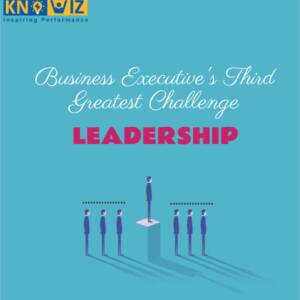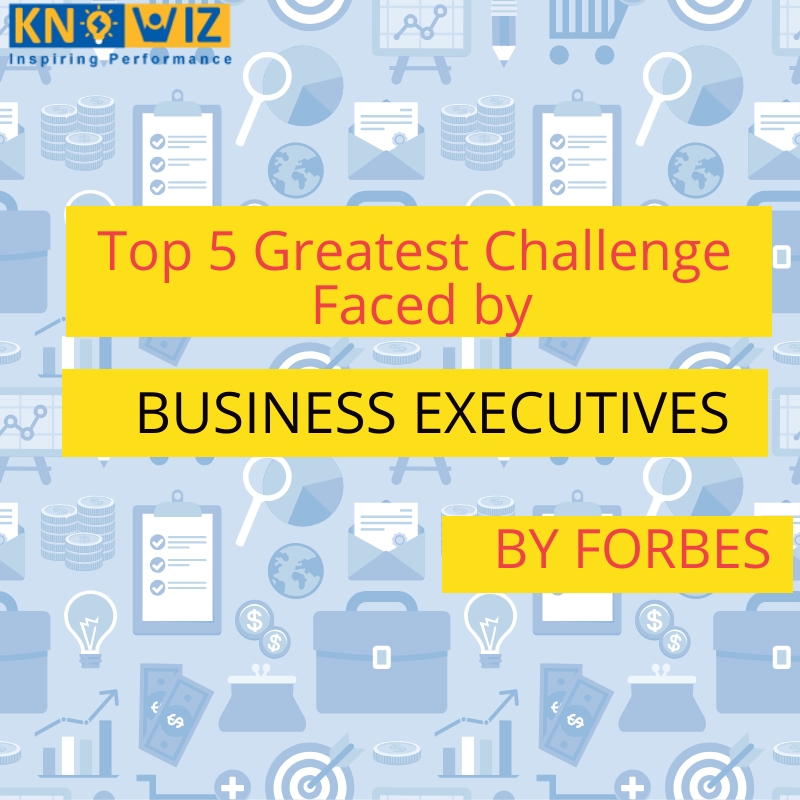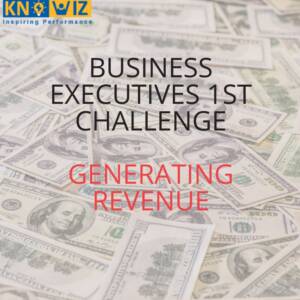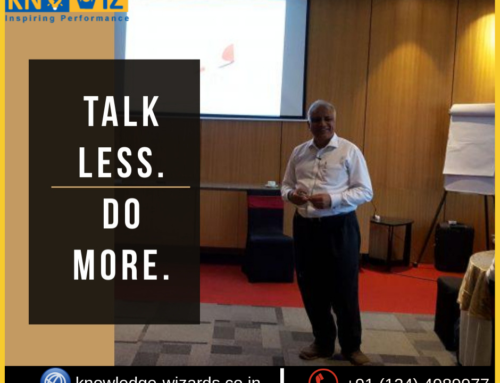Business Executives’ Greatest Challenge: Generating Revenue (26%)
The most-cited challenge for our Forbes Councils members was generating revenue. Whether seeking startup capital or consistency month-to-month, money is top of mind for today’s executives. Twenty-six percent of overall respondents, including 55% of sole proprietors (companies with only one employee), listed revenue and sales issues as their greatest business challenge, specifically noting:
- Getting in front of the right people to pitch a business
- Lead generation
- Raising capital
- Adding new clients
- Bringing in business
Because money is a big deal for everyone in business, many Forbes Councils members have the wisdom to share on this topic. Here are a few examples:
For aspiring entrepreneurs:
- Daniel Applewhite of Forbes Nonprofit Council outlined a mind-over-money approach for startup funding.
- 13 members of the Forbes Finance Council recently weighed in on financial readiness for starting a business.
For those who are already in business and want to keep the sales flowing:
- Caity Begg of Forbes New York Business Council recommends social selling — leveraging social media to personalize the sales process and decrease close time.
- Jason Tropf of Forbes Communications Council offers a nine-point checklist for targeting high-revenue leads.
- If you’re in a tight spot, Geanette Rodriguez-Ojeda of Forbes Finance Council suggests five strategies for managing a business with weak working capital.
- Ryan van Biljon of Forbes Business Development Council outlines the “land and expand” strategy for driving revenue.
Business Executives’ Second Greatest Challenge: Time (22%)
Twenty-two percent of the leaders we surveyed said time was their greatest challenge. Time was especially problematic for members of Forbes Communications Council (36%) and Forbes Finance Council (33%); leaders just below the C-suite in VP positions (29%), and financial services professionals (42%). Answers like the following emphasize the great need executives have for time to get things done:
- Finding the time to complete all of the tasks I need to do
- Managing my multiple commitments
- Balancing corporate leadership role with building my own business
- Making more time for original research and content creation
- Carving out time to pursue additional continuing education endeavors
- Managing priorities
- Having lots of opportunities to make a difference but not enough hours in the day to pursue them all
So how can you know where to invest your precious hours? Here are some fantastic ideas from Forbes Councils experts:
- Ben Peterson of Forbes Human Resources Council suggests that time management needs to begin with listing and ranking your priorities and goals.
- Laura Berger of Forbes Coaches Council provides an energy chart technique for visually representing the ways you spend your time.
- Pawel Kijko of Forbes Communications Council offers tips for time management when working remotely.
Business Executives’ Third Greatest Challenge: Leadership (19%)

From building a team and shaping employees’ skills to getting stakeholder buy-in and honing the company culture, leading a team is always a challenge. Nineteen percent of Forbes Councils members said leadership issues were their greatest challenges, with many of those coming from the Forbes Human Resources Council (57%) and Forbes Nonprofit Council (50%). Leadership was also important in the minds of executives in companies with 51–500 employees (42%). A few specifics our respondents cited include:
- Finding genuine and passionate people
- Administration in a small business setting
- Managing a global team
- Balancing employee appreciation with what is best for the business
- Finding ways [for] senior leaders to build enough self-awareness to work on themselves
If you’re concerned about hiring great talent and running your team smoothly, consider this advice from Forbes Councils members:
- Shane Green of Forbes Coaches Council suggests that experience isn’t everything; hiring managers should consider personality, work ethic, and values most likely to succeed.
- Abhijeet Narvekar of Forbes Human Resources Council explains in detail how to create a strategic focus for talent acquisition.
- Five members of the Forbes Nonprofit Council offer talent management tactics to beat the skills shortage.
Business Executives’ Fourth Greatest Challenge: Growth/Strategy (18%)
Eighteen percent of Forbes Councils members noted growth and strategy issues as their greatest challenge. Their concerns related to scaling and expanding existing businesses, including the strategic evolution of the company’s mission, function, and policies. Not surprisingly, this challenge stood out for members of Forbes Business Development Council (40%), members of Forbes Nonprofit Council, (33%), and those with the title of either owner, founder, or director (20%).

Specific concerns included:
- Scaling the business to the next level
- Organic growth
- National expansion
- Entering new market sectors
- Long-term strategy
- Prioritizing and executing my many goals
- Setting up strategic partners and affiliates
- Evolving and adapting our organization
- Achieving a precise vision of my market position
Could you use some tips on business strategies that support growth? Try these suggestions:
- Lisa Kent of Forbes Agency Council explains why innovation is essential to growth.
- Nirmala Reddy of Forbes Coaches Council discusses the basics of outlining a successful business strategy.
- Joel Landau of Forbes New York Business Council shares his strategies for growing one business while preparing to launch another.
- Marco Della Torre of Forbes Technology Council says the key to managing growth is to start with a strong core culture and build on it as you hire new people and implement new tactics.
- Don Markland of Forbes Business Development Council [gives] advice on how to “break things” — press boundaries and try new things — as you grow your business.
- Eight members of Forbes Nonprofit Council suggest ways to embrace a growth mindset.
Business Executives’ Fifth Greatest Challenge: Marketing (17%)
To bring in that all-important revenue, you have to be seen. Seventeen percent of respondents were concerned about getting the word out; attracting attention and creating exposure for themselves and their companies and brands. Marketing especially stood out for professional trainers and coaches (34%), as well as small companies (26% of those who employ 2–10 staff). Specific concerns included:
- Visibility
- Adequately communicating our mission and work
- Getting the word out about services
- Being heard above the ‘noise’ in the virtual space
- Getting the right exposure
- Marketing and communications (on a tight budget)

In an ideal world, doing good work would automatically create attention. But in our information-overloaded society, even the best causes, products, and services have to continuously seek new ways to stand out.
How can you put your work in the spotlight? Here are some great ideas from Forbes Councils members:
- If you’ve been farming out your marketing and are interested in taking more control, Forbes Agency Council members discuss transitioning to an in-house marketing team.
- What about all the buzz around influencer marketing? Divya Parekh of Forbes Coaches Council makes a case for developing “a strong message, persona, and credibility” for your brand first, and then capitalizing on the message you can send by partnering with an influencer.
- Pini Yakuel of Forbes Communications Council suggests using digital assistants as marketing assistants, and points out the strong points and pitfalls of this approach.
- John Mancini of Forbes New York Business Council delineates the strategies behind making content go viral, making content marketing as effective as it can be.
- 13 members of the Forbes Business Development Council suggest strategies for marketing to Generation Z.
Bonus: Breaking it Down
Wondering how the data breaks down? We parsed the data by dividing respondents into categories by: Forbes Council, industry, number of employees, and job title. You can see the results in the charts below.
Members of each Forbes Council had slightly different priorities. As you can see in the chart below, leadership was a prominent concern for members of Forbes Human Resources Council (with 57% of respondents citing it as their biggest challenge), Forbes Nonprofit Council (50%), and Forbes Technology Council (38%). Growth was most important overall for executives of the Forbes Business Development Council (40%), but also concerned members of Forbes Nonprofit Council (33%) and Forbes Human Resources Council (29%).
Among our participants, several industries were well-represented, including computers and technology; marketing, advertising, and PR; professional training and coaching; real estate; and financial services. When we examined concerns within each of these industries, a few stood out. Time was by far the biggest challenge for financial services execs (42%), while leadership dominated for those working in tech (36%). Revenue and marketing (34% each) were at the top of the list for coaches.






